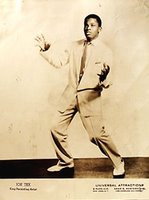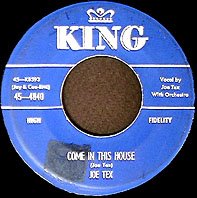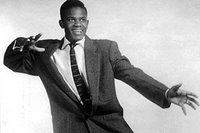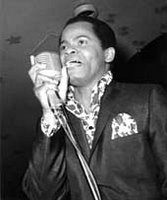Joe Tex - You Better Believe It Baby (Dial 4033)

You Better Believe It Baby
More Nashville Soul
Joseph Arrington Jr. grew up in Baytown, Texas, just across the river from Houston. In addition to singing in the church choir, he became well known as a dee-jay on local radio station KREL while he was still in high school. He won a local 'talent search' competition when he was 17, with an act that included his singing, dancing and comedy. The first prize was $300 and a trip to New York. While he was up there, Joe managed to win the fabled amateur night at the Apollo Theatre four weeks in a row (at which point they they told him not to come back)! He made up his mind to return to New York right then and there (once he finished high school, that is!).
He won a local 'talent search' competition when he was 17, with an act that included his singing, dancing and comedy. The first prize was $300 and a trip to New York. While he was up there, Joe managed to win the fabled amateur night at the Apollo Theatre four weeks in a row (at which point they they told him not to come back)! He made up his mind to return to New York right then and there (once he finished high school, that is!).
 His dynamic stage presence and nascient songwriting abilities caught the attention of Arthur Prysock who introduced him to the right people at King Records. Re-christened 'Joe Tex', they offered him a contract in 1955. Label-mate James Brown was so impressed with Tex's moves and 'microphone acrobatics', that he lifted them wholesale (he would go on to take Joe's Baby You're Right to #2 R&B in 1961). Joe, for his part, felt that he was kind of 'lost in the shuffle' at King, and moved on to New Orleans in 1957.
His dynamic stage presence and nascient songwriting abilities caught the attention of Arthur Prysock who introduced him to the right people at King Records. Re-christened 'Joe Tex', they offered him a contract in 1955. Label-mate James Brown was so impressed with Tex's moves and 'microphone acrobatics', that he lifted them wholesale (he would go on to take Joe's Baby You're Right to #2 R&B in 1961). Joe, for his part, felt that he was kind of 'lost in the shuffle' at King, and moved on to New Orleans in 1957.
 This was where it was all happening at that point, with Cosimo's studio cranking out hit after hit for folks like Little Richard and Larry Williams. Johnny Vincent signed him up on Ace, and paired him with James Booker. Despite this incredible combo, Tex remained pigeon-holed as a 'clown' and his 'novelty' records went nowhere. When Larry McKinley and Joe Banashak held their famous Minit records audition in January of 1960, Joe tried out, and was immediately accepted. the only problem was that he was still under contract with Vincent, who had no intention of letting him go to a cross-town rival.
This was where it was all happening at that point, with Cosimo's studio cranking out hit after hit for folks like Little Richard and Larry Williams. Johnny Vincent signed him up on Ace, and paired him with James Booker. Despite this incredible combo, Tex remained pigeon-holed as a 'clown' and his 'novelty' records went nowhere. When Larry McKinley and Joe Banashak held their famous Minit records audition in January of 1960, Joe tried out, and was immediately accepted. the only problem was that he was still under contract with Vincent, who had no intention of letting him go to a cross-town rival.
 They eventually worked it out, and Joe got his release. He next signed with Billy Davis' Anna Records up in Detroit. They were riding high with the success of Barrett Strong's Money at that point, and their distribution was picked up by Chess in Chicago. Joe's three singles for the label didn't make much impact, and by 1961, Davis (who was married to Berry Gordy's sister, Gwen) folded the label, and threw his weight behind the emergent Tamla/Motown empire to be. They, apparently, had no interest in signing Tex.
They eventually worked it out, and Joe got his release. He next signed with Billy Davis' Anna Records up in Detroit. They were riding high with the success of Barrett Strong's Money at that point, and their distribution was picked up by Chess in Chicago. Joe's three singles for the label didn't make much impact, and by 1961, Davis (who was married to Berry Gordy's sister, Gwen) folded the label, and threw his weight behind the emergent Tamla/Motown empire to be. They, apparently, had no interest in signing Tex.
 Buddy Killen, a man who was born in Muscle Shoals, had the music in his blood. He came up playing in local bands, and by 1951 had set off to Nashville to play bass in the house band at The Grand Ole Opry. He must have been good, as he ended up touring behind Country legends like Hank Williams and Jim Reeves.
Nashville, at this point, was just beginning to earn its reputation as "music city", and Killen was offered a job with the newly formed Tree Publishing Company. Buddy, a songwriter himself, had an 'ear for it', and was responsible for Tree getting the publishing rights to a little number called Heartbreak Hotel in 1955. Needless to say, that broke things wide open, and on the basis of that, Buddy was made part-owner of Tree in 1957. His own song, Forever, became a top ten hit for the Little Dippers in 1960, and things were looking good.
Buddy Killen, a man who was born in Muscle Shoals, had the music in his blood. He came up playing in local bands, and by 1951 had set off to Nashville to play bass in the house band at The Grand Ole Opry. He must have been good, as he ended up touring behind Country legends like Hank Williams and Jim Reeves.
Nashville, at this point, was just beginning to earn its reputation as "music city", and Killen was offered a job with the newly formed Tree Publishing Company. Buddy, a songwriter himself, had an 'ear for it', and was responsible for Tree getting the publishing rights to a little number called Heartbreak Hotel in 1955. Needless to say, that broke things wide open, and on the basis of that, Buddy was made part-owner of Tree in 1957. His own song, Forever, became a top ten hit for the Little Dippers in 1960, and things were looking good.
 Joe Tex was playing in a small club in Nashville in 1961 and just knocked the socks off of Killen's right hand man, Jerry Crutchfield. As legend has it, Buddy actually cut his Florida honeymoon short to fly back to Tennessee and see what all the fuss was about. He was as impressed as Jerry was with Joe as a 'singer-songwriter', and brought him into the studio to cut a demo. His own excitement about the possibilities of Joe's unique blend of Country and R&B notwithstanding, Buddy was unable to convince any of the major Nashville record labels to sign him. That's when he decided to start his own.
Joe Tex was playing in a small club in Nashville in 1961 and just knocked the socks off of Killen's right hand man, Jerry Crutchfield. As legend has it, Buddy actually cut his Florida honeymoon short to fly back to Tennessee and see what all the fuss was about. He was as impressed as Jerry was with Joe as a 'singer-songwriter', and brought him into the studio to cut a demo. His own excitement about the possibilities of Joe's unique blend of Country and R&B notwithstanding, Buddy was unable to convince any of the major Nashville record labels to sign him. That's when he decided to start his own.
 Dial Records was formed in 1961, with Killen using his industry connections to secure a distribution deal with London. Joe's first releases for the label didn't do much, in spite of the quality of the material. Great songs from this period like Meet Me In Church and I Wanna Be Free went unoticed as they had trouble finding an audience in either the Country or R&B markets.
After some ten Dial singles sank without a trace, Tex became disillusioned and was ready to call it quits. Buddy never lost sight of his belief in Joe's potential, however, and convinced him to come to Muscle Shoals to give it one last shot in October of 1964. They worked on a song Joe had written about losing his high school sweetheart, and he wasn't happy with the results. As he left for the long drive back to his home in Baton Rouge, he made Killen promise never to release it.
Dial Records was formed in 1961, with Killen using his industry connections to secure a distribution deal with London. Joe's first releases for the label didn't do much, in spite of the quality of the material. Great songs from this period like Meet Me In Church and I Wanna Be Free went unoticed as they had trouble finding an audience in either the Country or R&B markets.
After some ten Dial singles sank without a trace, Tex became disillusioned and was ready to call it quits. Buddy never lost sight of his belief in Joe's potential, however, and convinced him to come to Muscle Shoals to give it one last shot in October of 1964. They worked on a song Joe had written about losing his high school sweetheart, and he wasn't happy with the results. As he left for the long drive back to his home in Baton Rouge, he made Killen promise never to release it.
 Buddy, by now an old hand in the studio, went to work on the tune, beefing up the background track and eventually splicing the same chorus together several times before he was happy with it. Jerry Wexler, who already had his eye on Fame at this point, heard it and offered Killen a new distribution deal with Atlantic on the spot. When Hold What You've Got was released in January of 1965, it just took off, selling over 200,000 copies the first week and spending 2 months on the charts, where it climbed as high as #5 pop and #2 R&B (only kept from the #1 position by the Temptations' My Girl). When Joe first heard the song on the car radio, he called Killen and went off on him, but Buddy was able to calm him down with his first royalty check for the tidy sum of $40.000.
After ten long years, Joe Tex had finally arrived. Dial embarked on an agressive schedule of releases, with two singles - I Want To (Do Everything For You) and A Sweet Woman Like You - reaching the #1 spot back to back later that same year. Today's positively SMOKIN' tune was released in the Spring of 1966 as the flip of the top ten Vietnam record I Believe I'm Gonna Make It. Lending a certain 'british invasion' quality to Joe's Country Soul, I'm guessing it features the great Reggie Young and Tommy Cogbill, and shows off Killen's skills as a producer once again. I love the way the vocals fade out there at the end, right before the band comes right back at ya... un-huh!
Buddy, by now an old hand in the studio, went to work on the tune, beefing up the background track and eventually splicing the same chorus together several times before he was happy with it. Jerry Wexler, who already had his eye on Fame at this point, heard it and offered Killen a new distribution deal with Atlantic on the spot. When Hold What You've Got was released in January of 1965, it just took off, selling over 200,000 copies the first week and spending 2 months on the charts, where it climbed as high as #5 pop and #2 R&B (only kept from the #1 position by the Temptations' My Girl). When Joe first heard the song on the car radio, he called Killen and went off on him, but Buddy was able to calm him down with his first royalty check for the tidy sum of $40.000.
After ten long years, Joe Tex had finally arrived. Dial embarked on an agressive schedule of releases, with two singles - I Want To (Do Everything For You) and A Sweet Woman Like You - reaching the #1 spot back to back later that same year. Today's positively SMOKIN' tune was released in the Spring of 1966 as the flip of the top ten Vietnam record I Believe I'm Gonna Make It. Lending a certain 'british invasion' quality to Joe's Country Soul, I'm guessing it features the great Reggie Young and Tommy Cogbill, and shows off Killen's skills as a producer once again. I love the way the vocals fade out there at the end, right before the band comes right back at ya... un-huh!
 Joe had cracked the top ten with both of his releases (Skinny Legs And All and Men Are Gettin' Scarce) just prior to the issue of the Soul Clan single in June of 1968. He was, arguably, the hottest star on there at that point, and would continue his success on the charts well into the seventies - something his fellow Clan members would be unable to do.
Joe had cracked the top ten with both of his releases (Skinny Legs And All and Men Are Gettin' Scarce) just prior to the issue of the Soul Clan single in June of 1968. He was, arguably, the hottest star on there at that point, and would continue his success on the charts well into the seventies - something his fellow Clan members would be unable to do.
 It was around this time that Joseph Arrington Jr. changed his name once again, privately becoming Yusef Hazziez and embracing The Nation Of Islam. Publicly, he kept up his 'Joe Tex' persona and came up with his biggest hit yet in January of 1972, I Gotcha. This super-sized slab of funk was, once again, produced by Buddy Killen and spent over 4 months on the charts, including two weeks at #2 on the pop side. Although he kept up with touring, and TV appearances and the whole deal, Joe was content to take the money back to the ranch he built himself in Navasota, Texas, just up Highway 6 from Baytown.
It was around this time that Joseph Arrington Jr. changed his name once again, privately becoming Yusef Hazziez and embracing The Nation Of Islam. Publicly, he kept up his 'Joe Tex' persona and came up with his biggest hit yet in January of 1972, I Gotcha. This super-sized slab of funk was, once again, produced by Buddy Killen and spent over 4 months on the charts, including two weeks at #2 on the pop side. Although he kept up with touring, and TV appearances and the whole deal, Joe was content to take the money back to the ranch he built himself in Navasota, Texas, just up Highway 6 from Baytown.
 As the disco era progressed, Joe and Buddy jumped right in, breaking into the top ten with a song Killen wrote, Ain't Gonna Bump No More (With No Big Fat Woman). Released on Epic, Dial's new distributor, it became a huge club record in 1977, and sold millions. Although there were a few more releases to round out the decade, for the most part Joe hung out in Texas, rooting for The Houston Oilers and his friend Earl Campbell.
As the disco era progressed, Joe and Buddy jumped right in, breaking into the top ten with a song Killen wrote, Ain't Gonna Bump No More (With No Big Fat Woman). Released on Epic, Dial's new distributor, it became a huge club record in 1977, and sold millions. Although there were a few more releases to round out the decade, for the most part Joe hung out in Texas, rooting for The Houston Oilers and his friend Earl Campbell.
 In 1981, there were big plans for a Soul Clan reunion, complete with a world tour and a new album. At a press conference in New York in July of that year, Joe told author Gerri Hirshey "It ain't gonna work... We are five different men. Most of us are loners... a soul man is that, singular... As far as I can see, the future of the Soul Clan died with Otis Redding." As it turned out, he was right, the single concert held in NYC that summer was a disaster, and the rest of the plans failed to materialize.
On August 12, 1982 Joseph Arrington Jr. died suddenly from a massive heart attack on his ranch in Navasota. The pall-bearers at his funeral included Soul Clan members Don Covay, Wilson Pickett, and Ben E. King as well as the legendary Percy Mayfield and a broken-hearted Buddy Killen, who said that he had lost his 'best friend'. Solomon Burke would fly in later on and hold a private service for his family.
Peter Guralnick's wonderful Sweet Soul Music (also known around here as 'the bible') ends with this quote from Joe:
“It’s been nice here, man. A lot of ups and downs, the way life is, but I’ve enjoyed this life. I was glad that I was able to come up out of creation and look all around and see a little bit, grass and trees and cars, fish and steaks, potatoes. Everywhere I've gone, I can always go back, and I can always find a friend. I don't go trying to make nobody like me, I just be me, you know, and it has worked out, and I thank God for that. I’m thankful that He let me get up and walk around and take a look around here. ‘Cause this is nice.“
Yes it is.
____________________________________________________________________
(please check out the excellent piece on Joe (and his guitarist Johnny Williams) at Rob Whatman's superb Brown Eyed Handsome Man.)
In 1981, there were big plans for a Soul Clan reunion, complete with a world tour and a new album. At a press conference in New York in July of that year, Joe told author Gerri Hirshey "It ain't gonna work... We are five different men. Most of us are loners... a soul man is that, singular... As far as I can see, the future of the Soul Clan died with Otis Redding." As it turned out, he was right, the single concert held in NYC that summer was a disaster, and the rest of the plans failed to materialize.
On August 12, 1982 Joseph Arrington Jr. died suddenly from a massive heart attack on his ranch in Navasota. The pall-bearers at his funeral included Soul Clan members Don Covay, Wilson Pickett, and Ben E. King as well as the legendary Percy Mayfield and a broken-hearted Buddy Killen, who said that he had lost his 'best friend'. Solomon Burke would fly in later on and hold a private service for his family.
Peter Guralnick's wonderful Sweet Soul Music (also known around here as 'the bible') ends with this quote from Joe:
“It’s been nice here, man. A lot of ups and downs, the way life is, but I’ve enjoyed this life. I was glad that I was able to come up out of creation and look all around and see a little bit, grass and trees and cars, fish and steaks, potatoes. Everywhere I've gone, I can always go back, and I can always find a friend. I don't go trying to make nobody like me, I just be me, you know, and it has worked out, and I thank God for that. I’m thankful that He let me get up and walk around and take a look around here. ‘Cause this is nice.“
Yes it is.
____________________________________________________________________
(please check out the excellent piece on Joe (and his guitarist Johnny Williams) at Rob Whatman's superb Brown Eyed Handsome Man.)


















6 Comments:
OMG - I so remember to dancing to "Aint Gonna Bump No More"....'back in the day' - haha!
Great post. And I liked the song, although it sounds more like a Beatles song than a Joe Tex song. Coincidentally, I just got The Dial records Southern Soul Story (Kent UK 2003, 2 CDs) mainly for the Annette Snell songs, but it has a wealth of Joe Tex songs -- good album to get after getting Joe's greatest hits.
Keep up the great work!
Lyle
Excellent written. Always enjoying reading your "essays"!
Dominik
Thanks for the mention Red! Loved this article - especially the final quote(from Gerri Hershey's?). Some people think Joe is just corny, but often as not it turns out to be a simple but profound insight.
Sometime soon I'm going to write something about Joe Tex's King 45s, but I don't know much about King Records. Any info?
Rob-
Well, King records is certainly a DEEP subject... I know it was started by Syd Nathan in late 1943, and he had built his own studio in Cincinatti around 1948. Nathan was a shrewd and tireless businessman who saw the enormous sales potential of R&B early on. When he brought the legendary Ralph Bass in as his A&R man in 1951, things really started to happen. It was Bass who 'discovered' James Brown...
There's a great little book called Little Labels - Big Sound by Rick Kennedy and Randy McNutt that has a nice chapter on King (as well as other cool labels like Ace and Sun). Check it out!
I'm glad I get a chance to work with the legendary Joe Tex II his son if you would like more info hit me up.... Javi.bfd@gmail.com
Post a Comment
<< Home